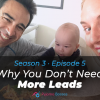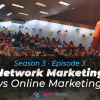How can I help a team member that has a major limiting belief? That’s a tricky question. I think it depends what is really a major limiting belief. I think the major limiting belief, and generally speaking, obviously, every case is different, but the core limiting belief most of the time is ‘I don’t think I can do this’. Then, it gets expressed in many, many different ways. The result of that, obviously, they paralyse. They do absolutely nothing. They hide from you. They don’t answer phone calls, maybe. They don’t attend events or trainings. They kind of disappear. One day they are super excited and the next day you never hear from them ever again.
To help a person like that to go through that limiting belief obviously is first of all to be able to have a chat, like a face to face conversation or maybe a Zoom or some kind of conversation where you ask them qualifying questions. It’s always about the quality of the question that you can ask. What I’ve seen over the past is that, first of all, when you go into that conversation with that person that has a major limiting belief, you need to be willing to let go, to let go of that person. Because maybe, it’s not the right time for that person. Maybe, they hang on so hard to that limiting belief that they’re not ready to move on and that’s a thing that you need to sometimes be able to understand, that it might not be the right timing for that person.
They’re still hanging on to that limiting belief so hard that no matter what you tell them they’re still going to be there. Now, despite of that, what I’ve always found very useful with people is to ask them open ended questions and trying to make them picture what their life would look like if they were to let go of that limiting belief that is holding them back. When you get somebody to have in their mind a picture of what it looks like, what that result looks like when they have let go of that limiting belief, you have an opportunity there and then to focus them into some immediate steps to get them into action, so they can get out of that belief which most of the time is ‘I don’t know if I can do this’. First of all, you make them picture that future after they let go of that limiting belief.
Once they are in that frame of mind, in that space, then you give them a very quick action taking step. That’s one thing. The other thing is always asking them questions about what if. What if you were to do this? Would that better your life? What if? What if questions, I think, sometimes that they are questions that people understand and they can easily see themselves in a future place. I think most of the time, if I was to help a team member get through that limiting belief, first, I would need to understand and ask them very … Well, ask permission to ask them very personal questions, I guess, so then I can understand where they’re at and whether they are ready to let go of that limiting belief.
Now, if at the end of that conversation I see they are still holding on to that limiting belief, the biggest mistake we’ve made in the past is to keep digging in that situation and trying to really get them out of where they are and them hanging on harder and harder to that limiting belief. At the end of that conversation, whether that’s for you it might be I don’t know maybe half an hour, an hour, that time frame that you put yourself, that appointment that you set up to help that person. At the end of that conversation, you need to be ready, if nothing else, to let go of that person and that time. You let them know that you love them, that you care about them, but that you can see that right now you’re going to let them be where they are.
There’s no reason to push them out when they don’t want to be encouraged to get out of that comfort zone. It’s always going back to whether you believe you can or you believe can’t, you are always right. If you want go hang on to your excuses, I’ll let you keep them and that’s pretty much what it is about. When you’re helping somebody to go through their own limiting beliefs, I think they need to be ready to let go of them. Once they are ready to let go of them, let me show you how you can, you’re able to let go of those limiting beliefs. That would be the best way you can actually help that person to go through that challenge.






